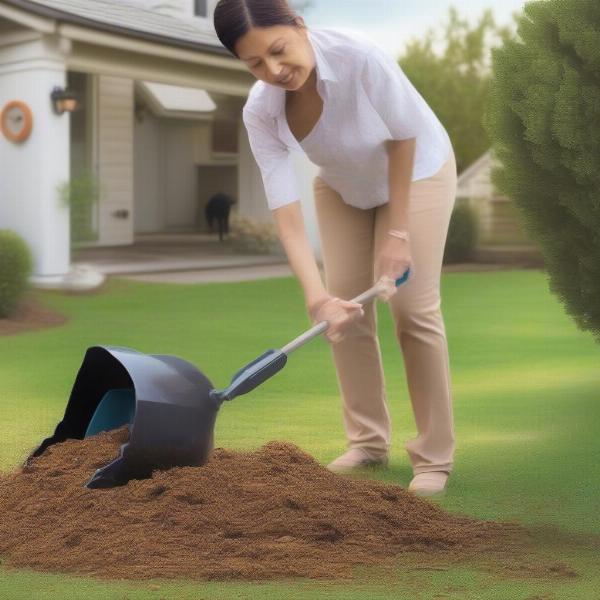Coprophagia, the act of eating feces, is a surprisingly common behavior in dogs. While unpleasant for owners, it’s important to understand that there are several reasons why a dog might engage in this “potty mouth” behavior, and most are not cause for serious alarm. This article will delve into the common causes of coprophagia, explore the potential health risks, and offer practical solutions for curbing this habit.
Why Do Dogs Engage in Coprophagia?
Several factors can contribute to a dog developing a taste for feces. Behavioral reasons can include boredom, stress, anxiety, or simply seeking attention. Sometimes, puppies will engage in this behavior as a way of exploring their environment. Medical reasons can include nutritional deficiencies, malabsorption syndromes, parasites, or certain medications that increase appetite. Additionally, some dogs might eat feces because they are simply attracted to the smell and taste, particularly if they are fed a bland diet.
Health Risks Associated with Coprophagia
While most cases of coprophagia are not life-threatening, there are potential health risks. Eating feces can expose dogs to harmful bacteria, parasites, and viruses. This can lead to gastrointestinal upset, including vomiting and diarrhea. In more serious cases, infections can occur. If your dog is eating the feces of other animals, the risk of contracting parasites and diseases is significantly higher.
How to Stop Your Dog from Eating Poop
Addressing coprophagia requires a multi-pronged approach. First, identify and address any underlying medical conditions. A vet checkup is essential to rule out any nutritional deficiencies or diseases. Once medical issues are addressed, focus on behavioral modification.
 Preventing a Dog From Eating Feces
Preventing a Dog From Eating Feces
- Keep your yard clean: The most effective preventative measure is to remove feces immediately after your dog eliminates. This removes the temptation altogether.
- Environmental enrichment: Provide your dog with plenty of toys and activities to keep them occupied and prevent boredom. Regular exercise and mental stimulation can significantly reduce stress and anxiety.
- Training and positive reinforcement: Train your dog to “leave it” when they approach feces. Reward them with treats and praise when they obey.
- Dietary changes: Ensure your dog is receiving a balanced and complete diet. Consult with your veterinarian to rule out any nutritional deficiencies and discuss appropriate dietary supplements.
- Taste deterrents: There are commercially available products designed to make feces taste unpleasant to dogs. These can be sprinkled on your dog’s food or directly onto the feces.
When to Consult a Veterinarian
If your dog’s coprophagia is persistent despite behavioral modifications and environmental changes, consult with your veterinarian. They can rule out underlying medical conditions and suggest further strategies for managing this behavior.
Conclusion
While coprophagia can be a frustrating habit, understanding its underlying causes and implementing the right strategies can help you address this behavior effectively. By maintaining a clean environment, providing adequate enrichment, and addressing any potential medical issues, you can help your dog break this unpleasant habit and live a healthier, happier life. Remember, consulting with a veterinarian is crucial for identifying any underlying health issues and tailoring a management plan specifically for your dog’s needs.
FAQ
- Is coprophagia dangerous for my dog? While usually not life-threatening, it can expose dogs to harmful bacteria and parasites.
- Why does my puppy eat poop? Puppies often explore their environment through their mouths. It could also be due to nutritional deficiencies.
- What are the best ways to prevent coprophagia? Immediate waste removal, training, and enrichment are key preventative measures.
- Can a change in diet help stop my dog from eating poop? Yes, a balanced diet can address potential nutritional deficiencies.
- When should I consult a vet about my dog’s coprophagia? If the behavior persists despite behavioral and environmental changes, consult a vet.
- Are there products that can make poop taste bad to my dog? Yes, there are commercially available taste deterrents.
- Can stress or anxiety cause coprophagia? Yes, behavioral issues can contribute to this habit.
ILM Dog is a leading international online resource dedicated to providing expert advice on all aspects of dog care and wellbeing. We offer a wealth of information on dog breeds, health, training, nutrition, and much more. Whether you’re a seasoned dog owner or just starting your journey, ILM Dog is here to help you provide the best possible care for your canine companion. For any inquiries or further assistance, contact us at [email protected] or +44 20-3965-8624.